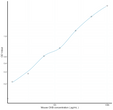| Tissue Specificity | Expressed in hippocampus and corpus callosum (at protein level). |
| Post Translational Modifications | Ubiquitinated by the ECS(ASB9) complex, leading to its degradation by the proteasome. |
| Function | Reversibly catalyzes the transfer of phosphate between ATP and various phosphogens (e.g. creatine phosphate). Creatine kinase isoenzymes play a central role in energy transduction in tissues with large, fluctuating energy demands, such as skeletal muscle, heart, brain and spermatozoa (Probable). Acts as a key regulator of adaptive thermogenesis as part of the futile creatine cycle: localizes to the mitochondria of thermogenic fat cells and acts by mediating phosphorylation of creatine to initiate a futile cycle of creatine phosphorylation and dephosphorylation. During the futile creatine cycle, creatine and N-phosphocreatine are in a futile cycle, which dissipates the high energy charge of N-phosphocreatine as heat without performing any mechanical or chemical work. |
| Protein Name | Creatine Kinase B-TypeB-CkCreatine Kinase B ChainCreatine Phosphokinase B-TypeCpk-B |
| Database Links | Reactome: R-MMU-71288Reactome: -MMU-9696264 |
| Cellular Localisation | CytoplasmCytosolMitochondrionCell MembraneLocalizes To The Mitochondria Of Thermogenic Fat Cells Via The Internal Mts-Like Signal (Imts-L) Region |
| Alternative ELISA Names | Creatine Kinase B-Type ELISA kitB-Ck ELISA kitCreatine Kinase B Chain ELISA kitCreatine Phosphokinase B-Type ELISA kitCpk-B ELISA kitCkb ELISA kitCkbb ELISA kit |
| output | |
Information sourced from Uniprot.org









